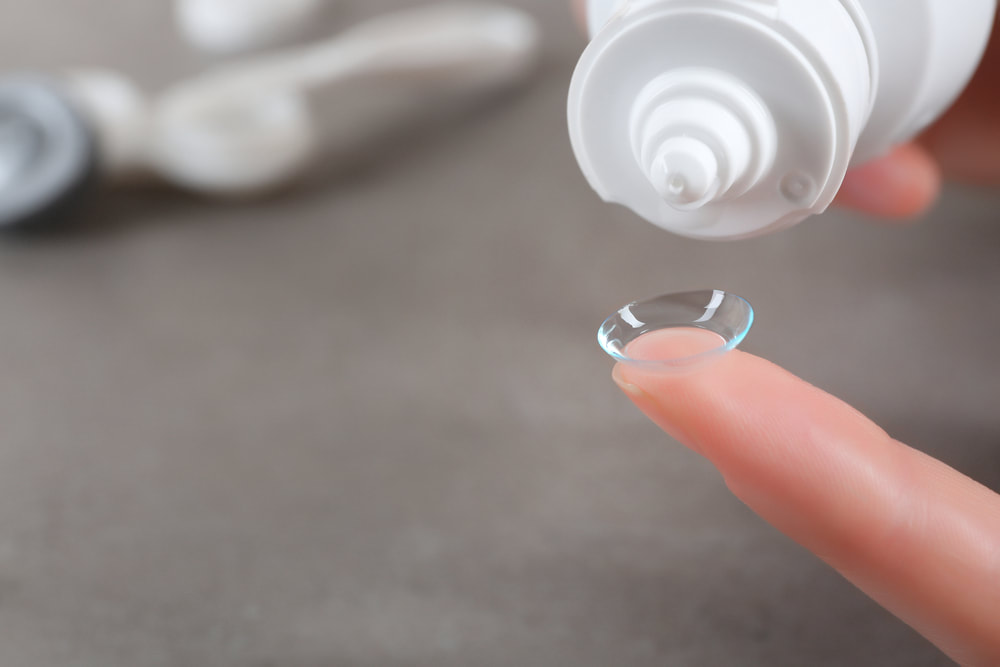In many cases, contact lens complications are preventable by recognizing problems early and taking certain steps. The week of August 19th starts Contact Lens Health Week to bring awareness to lens safety. Below are four complications that can occur with contacts and ways to reduce your risk. Dry eyes: Dry eyes can develop in people that do not wear contacts, but they may be more common in lens wearers. Wearing contact lenses usually does not cause dry eyes, but it can make it worse. One reason why contacts might lead to dry eyes is the lenses may absorb tears. If the lenses are poorly fitted, they may absorb too much liquid from the tear film. Symptoms of dry eyes include irritation, burning, and red eyes. Prevention: Make sure contacts fit well. If dry eyes develop, consider using artificial tears. If the problem still persists, talk with your doctor about additional options. Corneal abrasion: A corneal abrasion involves a scratch on the cornea. It is more likely to occur with poorly fitted contacts. It can also occur while you are putting your contacts in or taking them out. Symptoms of a corneal abrasion include pain, redness, and excess tearing. A corneal abrasion can lead to an infection if bacteria get into the scratch. A bacterial eye infection can become severe and threaten vision. Treatment often includes antibiotic eye drops. Prevention: One way to reduce your risk of a corneal abrasion is to be gentle when putting your contacts in and out of your eyes. Also, avoid rubbing your eyes when your contacts are in, and don’t sleep in your lenses. Conjunctivitis: Conjunctivitis involves inflammation of the white part of the eye. It can develop due to a virus or bacteria. According to the American Academy of Ophthalmology, giant papillary conjunctivitis is one of the most common forms of conjunctivitis that affects contact lens wearers. It can occur due to repeated irritation from the contacts. Symptoms include itchy, painful eyes, swollen eyelids, and excess mucus in the eyes. Prevention: To reduce your risk of conjunctivitis, only wear your lenses as instructed by the manufacturer. Also, wash your hands before handling your lenses. If the condition persists, take a break from wearing your contacts. Corneal edema: Corneal edema involves a buildup of fluid in the cornea. Contact lenses cover the cornea, which may decrease the amount of oxygen to the eye. The lack of oxygen, as well as the contact lens material, can lead to edema. Symptoms include blurry vision, sensitivity to light, and eye pain. Prevention: If you develop corneal edema, talk to your eye doctor. You may need to switch to a different type of lens. Certain types of lenses, such as silicone hydrogel lenses, allow more oxygen to get to the cornea than conventional lens material. General contact lenses safetyThere are some general safety precautions to take to reduce your risk of developing complications from wearing contacts. Consider the following tips:
If you have any questions about contact lenses or complications, please let us know. Also, if you would like to ask whether an appointment with one of our eye doctors would be appropriate at this time, call our office at 508-746-8600. Comments are closed.
|
EYE HEALTH BLOGCategories
All
Archives
July 2024
|
|
Kadrmas Eye Care New England
55 Commerce Way, Plymouth, MA 02360
14 Tobey Road, Wareham, MA 02571 133 Falmouth Road (Rt 28), Mashpee, MA 02649 |
Phone Number:
1-508-746-8600 Hours: Monday through Friday — 8 AM – 4:30 PM |


 RSS Feed
RSS Feed
